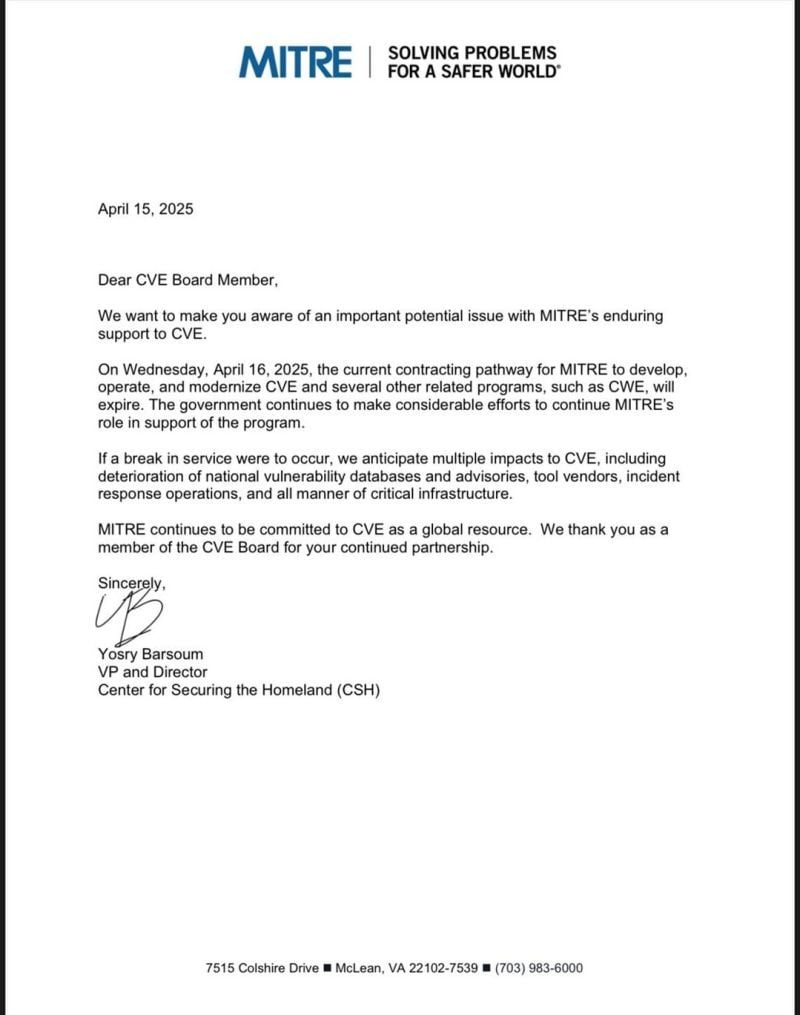MITRE Warns of CVE Funding Crisis as Contract Expires April 16

See Also: So, you want to be a hacker?
Offensive Security, Bug Bounty Courses
Industry Reactions: ‘A Cybersecurity Catastrophe in the Making’
Security leaders across the industry have warned of catastrophic consequences if CVE services go offline or slow down.
Jean Easterly, former head of CISA:
“Losing [the CVE system] would be like tearing out the card catalog from every library at once—leaving defenders to sort through chaos while attackers take full advantage.”
Casey Ellis, Bugcrowd Founder:
“CVE underpins vulnerability management, incident response, and critical infrastructure protection. A sudden interruption has the potential to bubble up into a national security problem in short order.”
CISA Responds Amid Growing Tension
While DHS, NIST, and DoD have yet to formally comment, a CISA spokesperson confirmed to BleepingComputer that:
“Although CISA’s contract with the MITRE Corporation will lapse after April 16th, we are urgently working to mitigate impact and to maintain CVE services on which global stakeholders rely.”
NVD Already Under Pressure
Compounding the crisis, NIST’s National Vulnerability Database (NVD) is also suffering from a growing backlog of CVEs needing analysis and enrichment. Without continued CVE assignments and updates, that backlog could surge into unmanageable territory, slowing patch development, tool updates, and vendor advisories.
Trending: Recon Tool: spoof_checker
What’s at Stake?
If MITRE is forced to pause or scale back operations:
- Vulnerability tracking across the industry may stall
- Security vendors could miss threats or duplicate work
- Incident response coordination may fail across government and enterprise
- Critical infrastructure defenses may weaken without timely vulnerability intelligence
This lapse also puts the entire CWE program at risk, which provides classification and understanding of software weaknesses that lead to vulnerabilities—essential for secure coding standards and automated detection systems.
Next Steps & Urgent Action Needed
Despite reassurances from CISA, industry insiders say time is running out. Without an immediate bridge contract or emergency funding, even a brief interruption in CVE operations could lead to long-term security gaps and systemic disruption.
As of this writing, MITRE is continuing operations, but its ability to sustain the CVE program beyond today remains uncertain.
The expiration of MITRE’s funding contract for CVE and CWE programs is not just a bureaucratic hiccup—it threatens the foundational infrastructure of global cybersecurity.
In a digital world under constant attack, the loss of CVE’s shared language and structure would force defenders to fly blind—while adversaries waste no time exploiting the chaos.
Are u a security researcher? Or a company that writes articles about Cyber Security, Offensive Security (related to information security in general) that match with our specific audience and is worth sharing? If you want to express your idea in an article contact us here for a quote: [email protected]
Source: bleepingcomputer.com


 Letter to CVE Board (
Letter to CVE Board (










